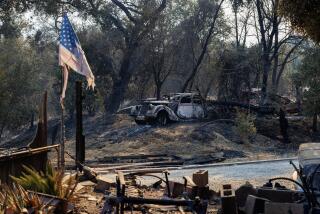Opinion May Undercut L.A. Wood Shingle Ban
In a development that could undercut the legality of Los Angeles’ new ban on wood shingle roofs, the state attorney general has issued an opinion declaring that cities do not have authority to impose fire codes more stringent than those of the state.
The opinion has irked city fire officials, who have long maintained that wood shake and shingle roofs are extremely dangerous because they are fire prone.
“This opinion is not really thought of very well,” Donald O. Manning, the Fire Department’s chief engineer, said Thursday.
Speaking at a meeting of the Board of Fire Commissioners, Manning said he had been told by the city attorney’s office that the opinion had not been well researched and was not considered a substantial roadblock to implementation of the ban on wood roofs.
The commission Thursday asked the city attorney’s office to draw up a formal response to the opinion.
The opinion was issued with little fanfare two weeks ago and City Council members said Thursday that they were unaware of it and were unsure how it would affect the ban.
The ordinance, passed overwhelmingly last July, bans new cedar shingle roofs and requires existing wood roofs to be replaced if they need repairs of more than 10% of their area. The outlawed roofing material is already in place on about 1.5 million homes in and around Los Angeles.
No Orange County communities have followed Los Angeles’ lead in banning wood shake roofs, even though fire officials advocate such a prohibition. County unincorporated areas and municipalities allow use of Class C materials, including wood shingles and materials of non-combustible construction. Class A materials, which include clay tile and some wood shakes that have been pressure-treated with a flame retardant, are considered most fire resistant.
“Wood shingle roofing is like putting 1,000 matchbooks on your roof and hoping on the Fourth of July a firecracker doesn’t land there,” said Capt. Hank Raymond, spokesman for the Orange County Fire Dept. “We’re trying to work with cities to get them to change codes and ordinances, but we run up against the very powerful building lobby. Tile roofs cost more, and it comes down to profit versus protection.”
In communities such as Yorba Linda, builders have stopped using wood shake roofs without city intervention. City codes set Class C materials as a minimum.
“We haven’t considered banning new wood roofs because, as a practical matter, we haven’t had a tract developed in 4 or 5 years that has used anything but tile,” said Phillip CQ Paxton, community development director. “We have over 1,000 homes built a year, and I can’t remember the last time we had anybody request wood shakes.”
The state does not ban wood roofs.
The attorney general’s opinion does not have the force of law, but it could bolster the legal position of the wood shingle industry, which has filed suit in federal court to block the ordinance.
Industry spokesmen have said the ban could be the death blow for the $150-million-a-year business of supplying the cedar shakes for roofs. The Los Angeles Basin has been the single largest market in the world for cedar shake roofs.
Attempts to reach industry spokesmen for comment on the attorney general’s opinion were unsuccessful Thursday.
The attorney general’s office issued the opinion at the request of the state fire marshal’s office, said Jack Winkler, an assistant attorney general.
According to state housing law, Winkler said, local governments do not have the authority to adopt codes regarding fire and panic safety that are more stringent than codes adopted by the state fire marshal’s office.
Joan Jennings, deputy director of the fire marshal’s office, said the opinion about local authority was requested about a year ago after several local governments were challenged by residents who objected to ordinances requiring automatic sprinkler systems.
Times staff Writer Jean Davidson contributed to this story.
More to Read
Sign up for Essential California
The most important California stories and recommendations in your inbox every morning.
You may occasionally receive promotional content from the Los Angeles Times.










